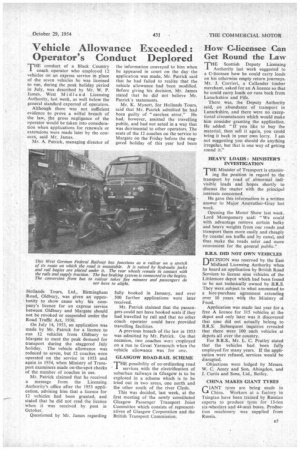Vehicle Allowance Exceeded: Operator's Conduct Deplored
Page 39

If you've noticed an error in this article please click here to report it so we can fix it.
THE conduct of a Black Country coach operator who employed 12 vehicles on an express service in place of the seven vehicles be was licensed to run, during the peak holiday period in July, was described by Mr. W. P. James, West Midland Licensing Atrthority, last week, as well below the general standard expected of operators.
Although there was not sufficient evidence to prove a wilful breach of the law, the gross negligence of the operator would be taken into consideration when applications for renewals or extensions were made later by the concern, said Mr. James.
Mr. A. Patrick, managing director of Hollands Tours, Ltd., Birmingham Road, Oldbury, was given an opportunity to show cause why his company's licence for an express service between Oldbury and Margate should not be revoked or suspended under the Road Traffic Act, 1930.
On July 14, 1953, an application was made by Mr. Patrick for a licence to run 12 vehicles from Oldbury to Margate to meet the peak demand for transport during the staggered July holiday. The vehicle allowance was reduced to seven, but 12 coaches were operated on the service in 1953 and again in 1954, when Ministry of Transport examiners made on-the-spot checks of the number of coaches in use.
Mr. Patrick claimed that he received a message from the Licensing Authority's office after the 1953 application, advising him that a licence for 12 vehicles had been granted, and stated that he did not read the licence when it was received by post in October.
Questioned by Mr. James regarding the information conveyed to him when he appeared in court on the day the application was made, Mr. Patrick said that he had failed to realize that the vehicle allowance had been modified. Before giving his decision, Mr. James stated that be did not believe Mr. Patrick's statements.
Mr. K. Mynett, for Hollands Tours, said that Mr. Patrick admitted he had been guilty of "careless error." He had, however, assisted the travelling public, and had not acted in a way that was detrimental to other operators. The seats of the 12 coaches on the service to Margate on the Friday before the staggered holiday of this year had been
fully booked in January, and over 500 further applications were later received.
Mr. Patrick claimed that the passengers could not have booked seats if they had travelled by rail and that no other coach operator could have provided travelling facilities.
A previous breach of the law in 1953 was admitted by Mr. Patrick. On that occasion, two .coaches were employed on a run to Great Yarmouth when the vehicle allowance was for one.
GLASGOW ROAD-RAIL SCHEME
THEpossibility of co-ordinating road services with the electrification of suburban railways in Glasgow is to be explored in a scheme which is to be tried out in two areas, one north and the other south of the river Clyde.
This was decided, last week, at the first meeting of the newly constituted Glasgow Passenger Transport Joint Committee which consists of representatives of Glasgow Corporation and the British Transport Commission.




























































































